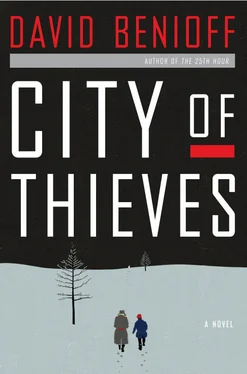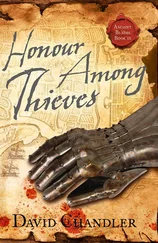“Do you know why it’s called Mga?” Kolya asked.
“Somebody’s initials?”
“Maria Gregorevna Apraksin. One of the characters in The Courtyard Hound is based on her. Heiress to a long line of field marshals, peculators, and royal toilet lickers. She’s convinced her husband is trying to murder her so he can marry her sister.”
“Is he?”
“Not at first, no. She’s completely paranoid. But she never shuts up about it and then he does start to fall in love with the sister. And he realizes life really would be better without his wife around. So he goes to Radchenko for advice, but he doesn’t know that Radchenko’s been fucking the little sister for years.”
“What else did he write?”
“Hm?”
“Ushakovo,” I said. “What other books did he write?”
“ The Courtyard Hound , that’s it. It’s a famous story. The book came out, it was a failure. There was only one review and the critic absolutely blasted it. Called it vulgar and despicable. Nobody read it. Ushakovo worked on that book for eleven years. Eleven years, can you imagine that? And it disappears like it was dropped into the ocean. But he starts all over again, a new novel; his friends who see pieces of it say it’s his masterpiece. Except Ushakovo’s getting more and more religious, spending time with this church elder who convinces him that fiction is Satan’s work. And one night Ushakovo becomes convinced that he’s going to hell; he’s in a complete panic; he tosses the manuscript in the fire. Poof, gone.”
This sounded strangely familiar.
“But that’s exactly what happened to Gogol.”
“Well, no, not exactly. Very different in the particulars. But an interesting parallel, I agree.”
The rails veered away from the road, past stands of birch saplings too slender for firewood. Five white bodies lay facedown in the white snow. A family of winter dead, the dead father still clutching his dead wife’s hand, their dead children sprawled a short distance away. Two battered leather suitcases lay open beside the corpses, emptied of everything but a few cracked picture frames.
The family’s clothes and boots had been stripped away. Their buttocks had been hacked off, the softest meat, easiest for making patties and sausages. I couldn’t tell if the family had been murdered by gunfire, or knives, or an exploding shell, by German artillerymen or Russian cannibals. I didn’t want to know. They had been dead a long time, at least a week, and their bodies had started to become part of the landscape.
Kolya and I continued east along the Vologda line. He didn’t tell any more jokes that morning.
A little before noon we reached the edge of the Leningrad defenses: thickets of barbed wire, trenches three meters deep, dragon’s teeth, machine-gun nests, antiaircraft batteries, and KV-1 tanks covered with white camouflage netting. The soldiers we had seen earlier had ignored us, but now we were too far east to be civilians, and too strange of a pair to be Army. As we walked along the tracks a band of young privates, hauling the tarpaulin off a 6x6 truck, turned to stare at us.
Their sergeant walked toward us, not pointing his carbine at us, precisely, but not pointing it away, either. He had the posture of a lifelong Army man and the high cheekbones and narrow eyes of a Tartar.
“You two have papers?”
“We do,” said Kolya, reaching inside his jacket. “We have excellent papers.”
He handed over the colonel’s letter and nodded toward the truck.
“That the new-model Katyusha?”
The tarpaulin had been flung to the ground, revealing racks of parallel rails jutting skyward, waiting to be loaded with rockets. According to what we heard on the radio, the Germans feared the Katyusha more than any other Soviet weapon—they called it Stalin’s organ, after the rockets’ low and mournful howls.
The sergeant glanced at the rocket launcher and back to Kolya. “Never mind about that. Which Army are you with?”
“The Fifty-fourth.”
“The Fifty-fourth? You’re supposed to be in Kirishi.”
“Yes,” said Kolya, giving the sergeant an enigmatic smile and nodding at the letter in the man’s hand. “But orders are orders.”
The sergeant unfolded the letter and read. Kolya and I watched the privates position the finned-tail rockets on the Katyusha’s rails.
“Give them hell tonight!” shouted Kolya. The soldiers on the truck glanced at us and said nothing. They looked like they hadn’t slept in days; it took all their concentration to load the rockets without dropping them, there was no energy to waste on madmen.
Unwilling to be ignored, Kolya began to sing. He was a baritone with a strong, confident voice.
“On the bank Katyusha starts singing, of a proud gray eagle of the steppe, of the one Katyusha loves deeply, of the one whose letters she’s kept.”
The sergeant finished the letter and refolded it. The colonel’s message had clearly impressed him; he looked at Kolya now with genuine respect, nodding his head in time with the old song.
“That’s the stuff. I heard Ruslanova herself sing it during the Winter War. Gave her a hand when she was coming offstage, think she had one glass too many. You know what she said to me? ‘Thank you, Sergeant,’ she said. ‘You look like a man who knows how to use his hands.’ What do you think of that? Always the hell-raiser, Ruslanova. But it’s a beautiful song.”
He slapped Kolya on the chest with the letter, giving it back, smiling at both of us.
“Sorry I had to stop you boys. You know how it is…. They say there’s three hundred saboteurs inside Leningrad and more coming every day. But now I know what you’re up to, working for the colonel….”
He gave Kolya a wink.
“I know all about it, organizing the partisans, that’s the stuff. You let us regulars take ’em from the front, you boys plug ’em from the back, we’ll be leaving hot turds in the Reichstag come summer.”
Kolya had read the colonel’s letter aloud the day we got it and it didn’t mention partisans—it said only that we should not be detained or harassed as we were operating under the discretion of the colonel himself—but the newspapers were full of stories about simple country folk who had been trained to fight as deadly guerrillas by NKVD specialists.
“You keep ’em dancing with the organ here,” said Kolya—I didn’t know if he was mimicking the sergeant’s speech intentionally or not—“and we’ll make sure they can’t get any more strudel from the Vaterland.”
“There you go, there you go! Cut off the supply lines, let ’em starve in the woods, it’ll be 1812 all over again.”
“But no Elba for Hitler.”
“No, no, not for him, no Elba for Hitler!”
I wasn’t entirely sure the sergeant knew what Elba was, but he was adamant that Hitler wouldn’t get it.
“We’ll give him a bayonet in the balls, but no Elba!”
“We should keep moving,” said Kolya. “We have to make Mga by nightfall.”
The sergeant whistled. “That’s a long way. Stay to the woods, you hear? Fritz owns the roads, but a Russian doesn’t need a road to walk on, does he? Ha! You have enough bread? No? We can spare some. Ivan!”
The sergeant shouted at a scruffy young private standing beside the truck.
“Find some bread for these boys. They’re going behind lines.”
Outside of Leningrad the trees still grew, crows muttered on birch branches, squirrels raced between the firs. The squirrels looked fat and innocent, easy targets for a man with a pistol. They were lucky to live in occupied Russia.
We marched through the woods, through open fields of cold sunshine, keeping the train tracks visible to our left. The snow was hard packed, scattered with pine needles, decent for walking. We were in German-controlled territory, but there was no indication of a German presence, no sign at all of war. I was strangely happy. Piter was my home, but Piter was a graveyard now, a city of ghosts and cannibals. Walking in the countryside I felt a physical change, as if I were breathing pure oxygen after months at the bottom of a coal mine. The tangles in my gut uncoiled, my ears unclogged, I had strength in my legs I hadn’t felt for months.
Читать дальше












